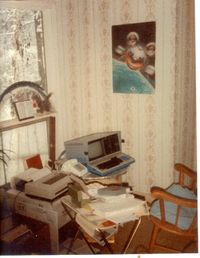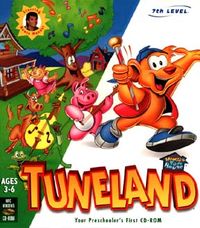Think of this as Volume 14, Number 29 of A-Clue.com, the online newsletter I've written since 1997. Enjoy.

We counted last night.
Kaleidocat (below, in 1979), Nuisance, HeyCat, Lo Meow, McDummy, FurPur, Salem and Rosanna, Indy, Missy, and the incumbents, Midget and Foxy Roxy.
My first PC was a Kaypro, shown on the right in 1983.
I thought it was sweet. CP/M, two floppy drives, an 8-inch green screen, and a case that, while it claimed to be "luggable," was really more like the tube-and-parts cases my dad's TV repair shop had in the 1960s. It weighed 26 pounds.

So that's 12 cats and 8 PCs. Of course I'm not counting the laptops I've owned, at least a half-dozen in all, or the four PCs I've bought for the kids.
The desktop era ended this week with my latest purchase, an MSI A6200 laptop I had first seen in the hands of a model at last year's CompuTex show. It's more powerful than any desktop I've owned, and today's "docking stations" are just boxes that sit to the side and let you connect anything else you want with USB ports. That means I can replicate my old desktop environment, with an extra monitor, a fancy keyboard, an external mouse, nice speakers.
It's a turning point. Where once I always needed two machines — one for here and one for the road — now I get it all with one. The new laptop cost less than half what my old Kaypro did, $700 against $1,800. And the software cost is also lower than ever. Windows is (unfortunately) bundled and everything else is downloaded, free.
Anyone involved in this business in any way needs to understand why this is so. Moore's Law is the flip and easy answer.
It's also misleading.

My most memorable example was the 1995 upgrade, which I made to review a 7th Level CD-ROM for my daughter called "Tuneland," starring Howie Mandel (left). Everyone at the launch party (and I met Linda Ronstadt there, among others) thought they were at the start of something. Turned out they were at the end.
Everything changed with the Web. The U.S. vs. Microsoft case came about because Microsoft saw, correctly, that the Web browser was going to become the center of the computing experience. It won the battle in court but gradually lost it with the rise of open source.
Open source transformed software. It was a product of the Internet's economics. People could now collaborate on code globally, they could distribute that code free, and all those old margins gradually flowed into users' pockets. Most PC software is now free, or comes bundled with the machine, and the exceptions (like Microsoft Office) are losing their hold to open source alternatives like Open Office.
The Internet eliminated the need to upgrade at the behest of software. Open source eliminated the need to pay for software. Without them we would still be chasing the PC dragon. Instead of mirroring my old drive to upgrade, as I'd done twice before, this time I just downloaded the programs I use most often and installed them. Less time, less hassle, everything's up to date.

- In the data center, it means using virtualization to consolidate servers and eliminate the dependence of applications on operating systems. Desktops are imaged centrally, delivered to base hardware with a few clicks, and the user never has to know that what's behind the curtain is not what he sees in front of him.
- In the consumer market, it simply means steadily increasing dependence on online resources rather than desktop software. It means using GMail or Hotmail instead of a Pop3 client like Outlook or Thunderbird. It means keeping your friends and interests in a social network like Facebook or LinkedIn rather than in a set of local files. It means the world's entire library is just a click away.
This is all possible because the Internet is massively-redundant and scales with demand. Fiber links can be improved simply by changing the gear at either end of the line. Server resources can be delivered through virtual server farms that also scale with demand.
The 2010s will be the decade of the cloud. We know that now, just as we understood that the last decade was one of gadgets, the one before that the decade of the Internet, the one before that the decade of the PC, and the one before that the decade of terminals and local nets. It seems to go that way, back-and-forth, between what's in front of you and what's above you. The last decade was a client decade. This is a network one.
Knowing this will enable you to do some planning, or at least anticipate change. My shorthand for this is simple.
We're all Google now.

This has tremendous implications for every part of our lives. If you can be productive anywhere then you can live anywhere, or nowhere. Increasingly our elites do precisely that, but it's going to become a more mass market phenomenon.
It means all sorts of brick-and-mortar institutions, starting with universities, have to now justify themselves in new ways or become virtual. It means there are tremendous opportunities to increase the effectiveness while reducing the costs of all kinds of services, even government services. And it means every business' connection with its customers is only as good as the data it has on them, and the data it can get them to willingly accept from them.
We used to say knowledge is power. Now learning is power. It's the only power. Your ability to learn new skills, to grasp new concepts, is your key to success in a world that's spinning ever-faster, and which has to spin that way in order to save itself from the Armageddon of global warming and ever-rising expectations. Because now the poor in their shantytowns know how the other half lives, they feel a right to the global village, and their hunger will create skills that get them in. Mexicans or Indians can suck up your jobs from where they are.
At some point the cloud becomes controversial. We can already see that in the growing number of controversies surrounding Google, and its attempts to deliver a global level of service everywhere in the world. Local politics, local policies, and local imperatives may seem strong now, but they can't stand forever against learning and knowledge. The barriers will fall.

But if you think anything is going to come easy, think again. We're all raindrops in the cloud. You're all magnetic ink. And while there is tremendous economic power coming our way, getting your share will be a struggle, perhaps the central struggle of our time.










Good article. I do worry about Google’s dominance though. They gather so much info about people, that it could be dangerous. The US Govt can already demand all that data under existing laws (Bush introduced some truly fascist legislation after the twin towers fell). Unfortunately we don’t see our Muslim in Chief repealing those laws.
Good article. I do worry about Google’s dominance though. They gather so much info about people, that it could be dangerous. The US Govt can already demand all that data under existing laws (Bush introduced some truly fascist legislation after the twin towers fell). Unfortunately we don’t see our Muslim in Chief repealing those laws.
Dana, you have a wisdom about you that is so admirable. I really love this blog and all the work you do year around with all your writing.
It is an exciting time, indeed. I tell the kids in my neighborhood that the most important skill they can develop is the ability to teach themselves new skills. I believe a big part of that starts with reading the Great Books and seeking to understand how our literary “conversation” has described and responded to the challenges of being human and our futures. Always be learning, I say. You’ll have a lifetime to waste time at your leisure, but for now, engage in meaningful play, and through that LEARN as much as you can wherever you can.
I’m upgrading my Linux distro this week to openSUSE 11.3. It’s amazingly simple and fast compared to installing Windows XP less than a decade ago. And I’m doing it on an old computer. Since most of my computer time is spent interacting with a browser accessing and sharing data, I don’t need an expensive OS, office suite, fancy gadgets, or all the proprietary shackles that accompany them. Because I’ve worked hard to pare down my computer time to (mostly) online apps, I can get far more done in less time — no software to buy, validate, register, upgrade, etc. Twitter alone has been one of the better tools to hit the web.
It’s difficult to describe to kids today what computing was like in 1984, much less how much fun it was back then! But Linux and the open source software that power the web’s content has helped eliminate boredom for now.
Dana, you have a wisdom about you that is so admirable. I really love this blog and all the work you do year around with all your writing.
It is an exciting time, indeed. I tell the kids in my neighborhood that the most important skill they can develop is the ability to teach themselves new skills. I believe a big part of that starts with reading the Great Books and seeking to understand how our literary “conversation” has described and responded to the challenges of being human and our futures. Always be learning, I say. You’ll have a lifetime to waste time at your leisure, but for now, engage in meaningful play, and through that LEARN as much as you can wherever you can.
I’m upgrading my Linux distro this week to openSUSE 11.3. It’s amazingly simple and fast compared to installing Windows XP less than a decade ago. And I’m doing it on an old computer. Since most of my computer time is spent interacting with a browser accessing and sharing data, I don’t need an expensive OS, office suite, fancy gadgets, or all the proprietary shackles that accompany them. Because I’ve worked hard to pare down my computer time to (mostly) online apps, I can get far more done in less time — no software to buy, validate, register, upgrade, etc. Twitter alone has been one of the better tools to hit the web.
It’s difficult to describe to kids today what computing was like in 1984, much less how much fun it was back then! But Linux and the open source software that power the web’s content has helped eliminate boredom for now.